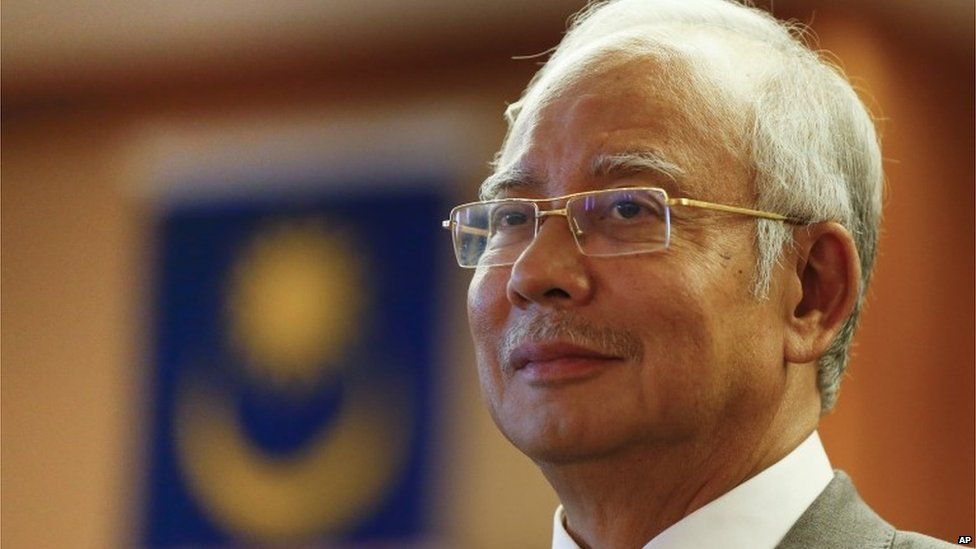Malaysia PM Najib Razak sacks deputy over 1MDB scandal
- Published

Malaysia's Prime Minister Najib Razak has replaced his deputy amid a continuing financial scandal.
Muhyiddin Yassin had criticised Mr Najib's handling of allegations surrounding a state investment fund.
Mr Najib has denied allegations that nearly $700m (£450m) were transferred to his personal bank accounts from the 1MDB fund, which he set up in 2009.
Attorney General Abdul Gani Patail, who led the investigation into the scandal, was also replaced, said state media.
The statement carried by the Bernama news agency said his dismissal was on health grounds.
The BBC's Jennifer Pak in Kuala Lumpur says that with these latest developments, Malaysians have doubts about whether the truth of the scandal will come out.
Though Mr Najib appears to have bought himself some time, there is continuing pressure and he still faces a lot of questions from opposition parties as well as from within his own party, the United Malays National Organisation (Umno), says our correspondent.
Buying time? By Jennifer Pak, BBC News, Kuala Lumpur
Mr Najib has now stacked his cabinet with supporters and attempted to silence his critics over the troubled 1MDB fund.
The crisis is the biggest he's faced in six years in office - and despite his denials, the questions aren't going away. The public want answers.
Analyst Oh Ei Sun says the reshuffle may temporarily ease the pressure, but the prime minister still faces intense scrutiny from opposition parties and from within his party, especially from his former mentor Mahathir Mohamad.
While money politics is not new in Malaysia, the vast sums involved have captivated Malaysians at a time when their food and petrol subsidies have been cut and they are forced to pay a new consumption tax.
Now with the replacement of the attorney general, there are questions whether the Malaysian public will get the truth.
'Strong team'
Announcing the dismissal of Mr Muhyiddin on television, Mr Najib said that differences in opinion were "not supposed to be expressed in an open forum, which is against the concept of collective responsibility in the government".
He said the decision was "a very difficult one, but I had to do it so a strong team can move forward".
Mr Muhyiddin has been replaced by former home minister, Zahid Hamidi, said Mr Najib. Four other ministers have also been replaced in a cabinet reshuffle.
On Sunday night, Mr Muhyiddin had spoken on the 1MDB issue at an Umno party meeting which was covered by local media.
He revealed he had urged Mr Najib to step down from 1MDB. The Malaysian Insider quoted him saying: "I told him to let go of his post in 1MDB, but he didn't want to listen...I don't have any evil intention, my will is to help him."
He also called on Mr Najib to personally explain the issue.
"[The ministers] cannot explain properly because even we don't know the real facts, so who is going to tell us the real facts, it should be the prime minister, true or not," he was reported as saying by The Star.
1MDB (1Malaysia Development Berhad) says it has never given money to Mr Najib and that the allegations are unsubstantiated.
Mr Najib says he is the victim of "political sabotage" and has accused influential former prime minister Mahathir Mohamed of orchestrating a smear campaign to topple him.
What is 1MDB?
- The 1Malaysia Development Berhad state investment fund was started by Prime Minister Najib Razak in 2009 to turn Kuala Lumpur into a financial hub and develop the national economy.
- It began attracting attention at the end of 2014 when it started missing payments. It later emerged that the fund was mired in $11bn (£7bn) of debt.
- Mr Najib, who is the chairman of the fund's board of advisers, has been accused of taking $700m from the fund - a charge which he has denied and blamed on a political smear campaign.
- Published22 July 2016
- Published8 July 2015
- Published8 July 2015
- Published28 July 2020